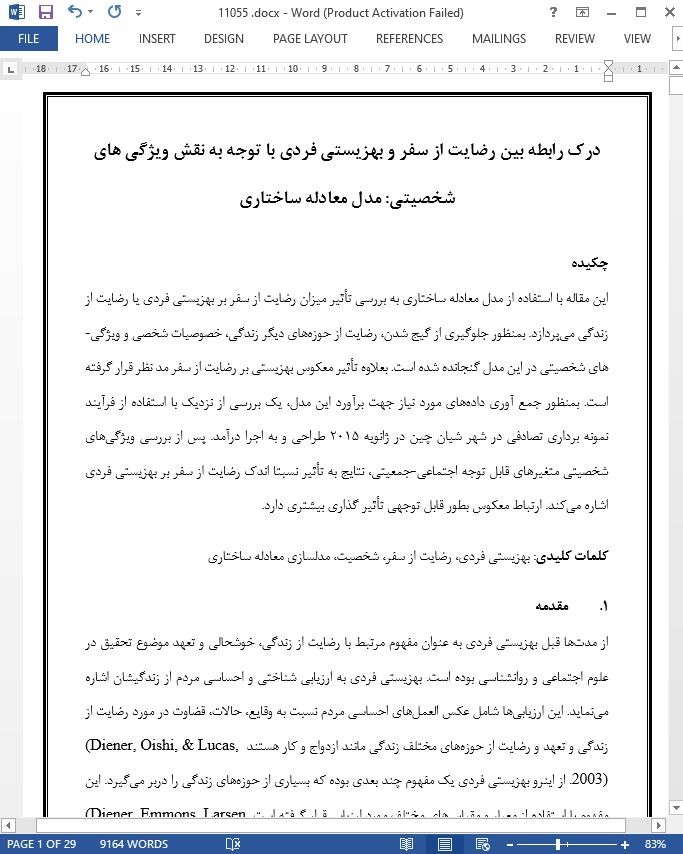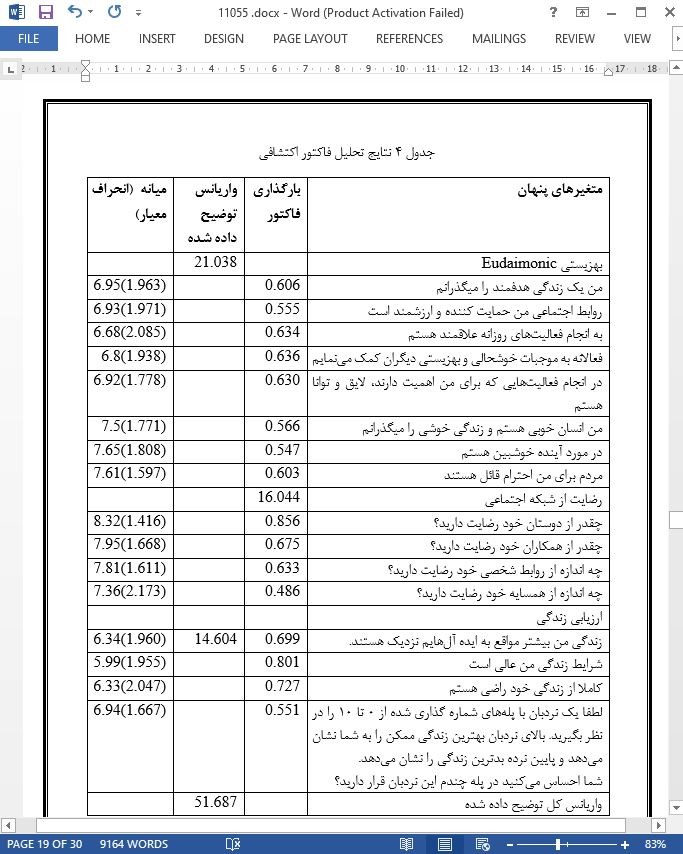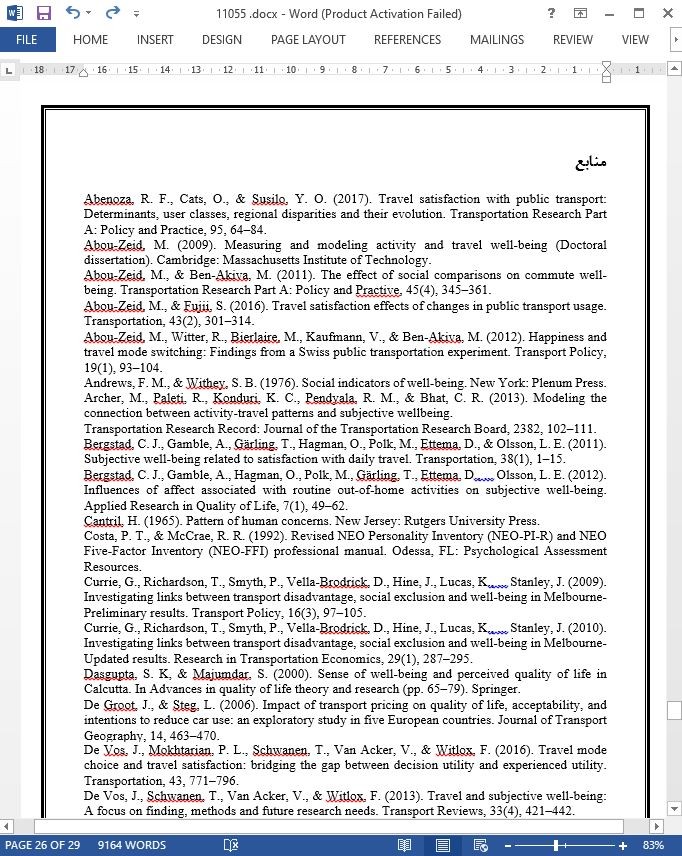
درک رابطه بین رضایت از سفر و بهزیستی فردی با توجه به نقش ویژگی های شخصیتی
چکیده
این مقاله با استفاده از مدل معادله ساختاری به بررسی تأثیر میزان رضایت از سفر بر بهزیستی فردی یا رضایت از زندگی می پردازد. بمنظور جلوگیری از گیج شدن، رضایت از حوزه های دیگر زندگی، خصوصیات شخصی و ویژگی های شخصیتی در این مدل گنجانده شده است. بعلاوه تأثیر معکوس بهزیستی بر رضایت از سفر مد نظر قرار گرفته است. بمنظور جمع آوری داده های مورد نیاز جهت برآورد این مدل، یک بررسی از نزدیک با استفاده از فرآیند نمونه برداری تصادفی در شهر شیان چین در ژانویه 2015 طراحی و به اجرا درآمد. پس از بررسی ویژگی های شخصیتی متغیرهای قابل توجه اجتماعی-جمعیتی، نتایج به تأثیر نسبتا اندک رضایت از سفر بر بهزیستی فردی اشاره می کند. ارتباط معکوس بطور قابل توجهی تأثیر گذاری بیشتری دارد.
1. مقدمه
از مدت ها قبل بهزیستی فردی به عنوان مفهوم مرتبط با رضایت از زندگی، خوشحالی و تعهد موضوع تحقیق در علوم اجتماعی و روانشناسی بوده است. بهزیستی فردی به ارزیابی شناختی و احساسی مردم از زندگیشان اشاره می نماید. این ارزیابی ها شامل عکس العمل های احساسی مردم نسبت به وقایع، حالات، قضاوت در مورد رضایت از زندگی و تعهد و رضایت از حوزه های مختلف زندگی مانند ازدواج و کار هستند (Diener, Oishi, & Lucas, 2003). از اینرو بهزیستی فردی یک مفهوم چند بعدی بوده که بسیاری از حوزه های زندگی را دربر می گیرد. این مفهوم با استفاده از معیار و مقیاس های مختلف مورد ارزیابی قرار گرفته است(Diener, Emmons, Larsen, & Griffin, 1985; Diener & Suh, 1997). به عنوان جایگزین مفهوم سودمندی، بهزیستی فردی به عنوان معیار مزایای افراد در حوزه های مختلف زندگی پیشنهاد شده است (Kahneman, Diener, & Schwarz, 1999).
7 مبحث و نتیجه گیری
هدف از این مطالعه، یکی از اولین طرح ها در چین، درک بهتر رابطه بین رضایت از مسافرت و سلامتی فردی است. با توجه به دیدگاه جامع نسبت به مطالعات اخیر در مورد این بحث در پژوهش حمل و نقل، این مطالعه شامل (i) سنجش لذت گرا و eudaimonic بهزیستی فردی هستند، (ii) این مطالعه امکان وابستگی متقابل بین رضایت از سفر و بهزیستی فردی را فراهم می سازد. ، (iii) مدعی است که بهزیستی فردی تحت تأثیر رضایت مستقل مردم با حوزه های زندگی قرار دارد، (iv) امکان تأثیر احتمالی ویژگی های شخصیتی بر طبقه بندی از رضایت را فراهم می کند.
Abstract
Using a structural equation model, this article examines to what extent subjective well-being or life satisfaction is influenced by travel satisfaction. To avoid confounding, satisfaction with other life domains, personal characteristics and personality traits are included in the model. In addition, the reverse effect of well-being on travel satisfaction is considered. To collect the data needed to estimate the model, a survey was designed and administered face-to-face in January 2015 in Xi’an, China using a random sampling procedure. After controlling for personality traits and significant socio-demographic variables, results indicate that travel satisfaction has a relatively small impact on subjective well-being. The reverse relationship is considerably stronger.
1. Introduction
Since long, subjective well-being, a concept closely related to life satisfaction, happiness and fulfilment has been a topic of research in social and psychological sciences. Subjective well-being expresses people’s cognitive and emotional evaluations of their lives. These evaluations include people’s emotional reactions to events, their moods, judgments of life satisfaction and fulfilment, and satisfaction with different domains of life such as marriage and work (Diener, Oishi, & Lucas, 2003). Thus, subjective well-being is a multi-dimensional concept that covers many life domains. The concept has been measured using a variety of different scales (Diener, Emmons, Larsen, & Griffin, 1985; Diener & Suh, 1997). As an alternative to the concept of utility, subjective well-being has been proposed as a measure of individuals’ benefits in a number of different life domains (Kahneman, Diener, & Schwarz, 1999).
7. Discussion and conclusions
This study, one of the first of its kind and scope in China, was conducted to better understand the relationship between travel satisfaction and subjective well-being. Taking a more comprehensive perspective than typical previous studies on this topic in transportation research, this study (i) includes both hedonic and eudaimonic measure of subjective well-being, (ii) allows for mutual dependency between travel satisfaction and subjective well-being, (iii) acknowledges that subjective wellbeing is influenced by people’s interdependent satisfactions with different domains of life, and (iv) allows for possible influence of personality traits on satisfaction ratings.
چکیده
1. مقدمه
2. مروری بر ادبیات
1.2 رضایت از سفر و بهزیستی فردی
2.2 مفهوم بهزیستی فردی
3.2 سنجش بهزیستی فردی و رضایت از سفر
4.2. شخصیت و بهزیستی فردی
3. چهارچوب مفهومی
4. جمع آوری داده¬ها و مقیاس¬های اندازه گیری
1.4. فرآیند
2.4 سنجش
5. تحلیل داده¬های مقدماتی
1.5 شرح نمونه
2.5 تأیید
6. مدل معادله ساختاری
1.6 مدل تخمین
2.6 مدل ساختاری
7 مبحث و نتیجه گیری
Abstract
1. Introduction
2. Literature review
2.1. Travel satisfaction and subjective well-being
2.2. The concept of subjective well-being
2.3. Measurements of subjective well-being and travel satisfaction
2.4. Personality and subjective well-being
3. Conceptual framework
4. Data collection and measurement scales
4.1. Procedure
4.2. Measurement
5. Preparatory data analysis
5.1. Sample description
5.2. Validation
6. Structural equation model
6.1. Measurement model
6.2. Structural model
7. Discussion and conclusions
- ترجمه فارسی مقاله با فرمت ورد (word) با قابلیت ویرایش، بدون آرم سایت ای ترجمه
- ترجمه فارسی مقاله با فرمت pdf، بدون آرم سایت ای ترجمه



